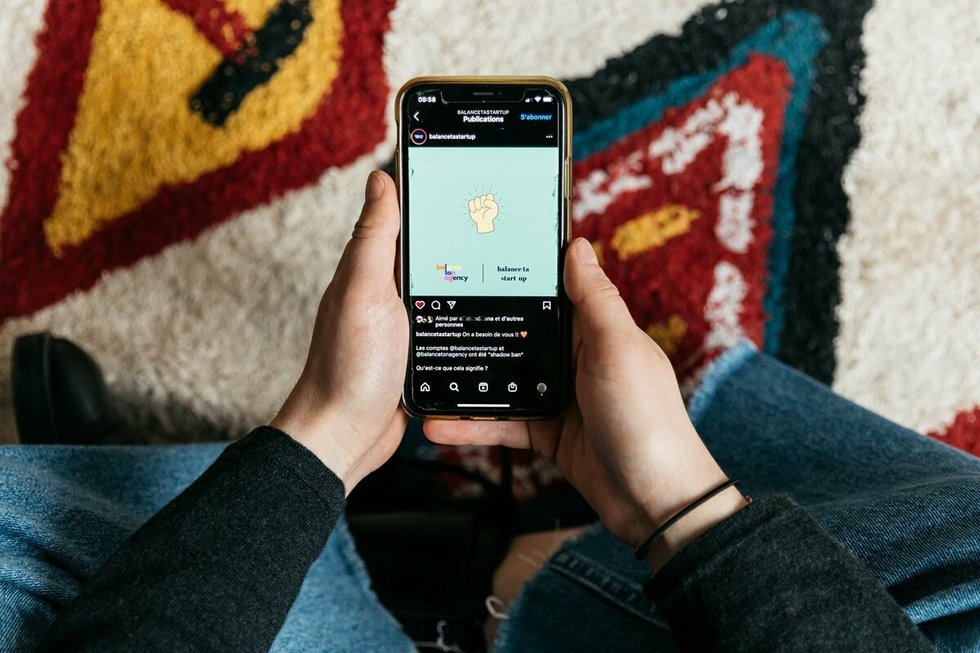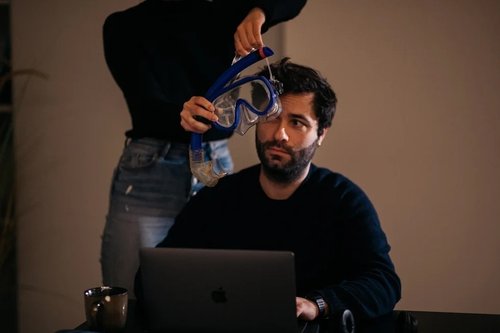Expose your employer: how French Instagram is fighting toxic office culture
Mar 09, 2021
6 mins


Multilingual journalist
It’s a simple yet striking visual on a social media platform: bright purple, chunky quote marks, and a hard-hitting sentence. “Now you’re pregnant, I love your big breasts,” it spells out. These words were reportedly uttered by the managing director in the office at Publicis, an advertising agency in Paris. Another visual read: “Be careful when recruiting, we have enough exotic profiles.”
Advertising industry professionals submitted these testimonies to the anonymous Instagram account Balance Ton Agency (Expose your Agency). Launched last September, the profile has given rise to a #MeToo movement among French employees—although it’s not just for women, nor is it only about sexual harassment.
Type the French word “balance”—“to expose”—into Instagram’s search bar and you’ll discover a slew of anonymously run accounts. They share a common goal: to call out injustice in the workplace, whether it’s sexual harassment, racism, abusive working conditions or toxic management. French employees across diverse industries are flocking to these profiles to speak out about issues and make change happen. The movement has already forced real-life changes—but like anything that thrives on social media, it isn’t perfect.
Since the launch of Balance Ton Agency in September 2020, directors have stepped down, merger offers have been withdrawn and internal inquiries launched. Meanwhile, thank-you messages and fresh accusations keep flooding the inbox of Julie* who runs the account, which has more than 67,000 followers.
Balance Ton Agency has triggered a chain reaction. Other “balance” accounts now exist that reach far beyond the advertising world. Virtually every industry now has its anonymous “balance” or “snitch” account—fashion, consulting firms, media companies—as well as particular ecosystems such as startups. They roll out testimonies every day ranging from inappropriate jokes to serious accusations.
A space for free speech about work
Julie had been working in the advertising industry for 10 years when her last job in a smaller agency led to burnout in March 2020. Six months later, Julie felt ready to accept a new role but was afraid of going through a similar experience again. “I had heard a lot about advertising agencies with horrible working conditions and practices. I thought, this is crazy, there are all these rumors but no space to talk about them and shine a light on these practices so that they stop”, she said.
Julie was partly inspired by a similar account dedicated to interns experiencing harassment. Balance Ton Stage, a student-run account, is a space for sharing stories anonymously and learning about forms of harassment rather than a way of calling out specific companies or people, which Julie felt was necessary to do. “There is a liberation of speech happening in France,” she said. “A lot of people find it kind of hard to understand the whole ‘liberation of speech’ aspect because after all, we have always been able to speak. But our voices were never heard or listened to.”
Julie is unemployed and spends an average of 11 hours per day sifting through and replying to testimonies. “I went through professional burnout [last year], and I said to myself that I was now going to burn out from my activism,” she said.
The “balance” accounts are a continuation of the #MeToo movement, which in France became synonymous with the hashtag #Balancetonporc, meaning “expose your pig”. The expression was coined in 2017 by journalist Sandra Muller who accused media executive Eric Brion of sexual harassment. The expression “balance” is now used to denounce a wide array of injustices suffered by both women and men, in and outside of work.
In the US, the pandemic spawned an online movement among restaurant workers from Oregon to New York called the 86d List, a space to share stories of injustice. The name is a reference to the industry’s slang expression for an item that is no longer available on the menu or a person who is no longer welcome on the premises. Similarly, last summer’s racial protests following George Floyd’s killing gave rise to anonymous sharing of racial injustices suffered by black employees in specific companies such as @blackatamazon or @blackatpaypal.
How these accounts work
The French online movement appears unique in its scope and organization, with accounts unanimously adopting the “balance” handle. The admins, always anonymous, swear to protect the identity of those whose testimonies they publish, and commit to verifying whether the person works or worked for the company before publicly sharing their story.
“They send me a photo of their job contract or a link to their LinkedIn profile, which I compare to their Instagram profile,” said Sara*, the admin behind Balance Ta Start-Up, which has more than 178,000 followers. The profile hit the headlines when it featured several dozen testimonies denouncing toxic management and unethical practices at the popular jewelry startup Lou-Yetu.
What is harder, and often impossible to verify, however, are the elements of the testimony reported. Sara receives around 300 messages every day and finds it important to “put things into perspective” instead of publishing stories as soon as they land in her inbox. “I can’t allow myself to post an account based on ‘a friend of a friend told me that…’,” she said. “I don’t want this account to become a place for out-of-control defamatory libel.” She added that employers had the right to reply on her profile.
“Balance” accounts generally wait for concurring accounts about the same company or person inside the company before publishing. “I’m accumulating testimonies, sorting through them, asking questions,” said Sara. “If I receive only one account regarding one person in one company, I’m unlikely to go ahead and publish it. It might be personal, and then it’s serious to say stuff like that.”
Lawyers hold diverging views on the movement. Eric Manca, an expert in employment litigation at the law firm August & Debouzy, said: “What’s happening is a liberation of speech under pseudonyms. Those calling out are hidden, but they’re exposing flesh-and-blood people.” He finds the initiative legitimate in principle but he regrets how it is being executed. “We have given way to immediacy, confusing speed with haste, and paved the way for something unmanageable.”
Others, including Elise Fabing, an employment lawyer and founder of Alkemist Avocats, point out that these Instagram accounts, while far from perfect, are a symptom of a broken social justice system that “doesn’t allow for real access to one’s rights”.
“These accounts shouldn’t exist: we should have a legal system that functions, with quick rulings at the employment tribunal, where you can go easily without it being expensive; on the company side, there should be the pressure of a litigation risk when behaving badly. But that’s not the case today,” she said.
Collective awakenings
The testimonies from French employees are wide-ranging. Paul* worked as a copywriter at the advertising agency Wunderman Thompson. He gave up his career after experiencing workplace harassment that ended in burnout.
When he discovered Balance Ton Agency, he came across multiple stories about his former employer and discovered “nearly identical” testimonies about the creative director who had bullied him several years ago. “I felt less alone in this story, it kind of warmed my heart,” he said.
At the time, Paul got little help from HR and hired a lawyer to help him file a complaint with an employment tribunal. But the court procedure was slow and harrowing. Paul had to wait almost a year for the first meeting at the employment tribunal and ended up abandoning the case for the sake of his mental health. He believes that calling out a company or a toxic manager via “balance” accounts is the “only option” for many employees.
“It feels a bit brutal to expose agencies like that. It’s stuff that may be justified, but it’s perhaps not justifiable to do it publicly as it’s certainly a little gratuitous. Still, if it wasn’t done, we would never be listened to,” he said. Paul believes this fight “which happens without justice” needs to persist as it paves the way for a collective awakening. “It’s a point of reference for employees. Altogether, we are saying that what we’re going through isn’t normal.”
Several “balance” accounts were recently shadow-banned by Instagram’s algorithm due to the high number of reports filed. Manca believes that the movement needs regulation so it can be held accountable in return. “The gravity of accusations leveled [at companies or individuals] requires a serious job of filtering, controlling and verification of information, which these movements do not undertake because they simply don’t have the means nor the legitimacy to do so,” he said.
The way forward
Account admins say they are not just interested in exposing toxic managers or unethical practices—they also dispense practical legal knowledge. Guillaume*, who manages Balance Ton Cabinet, an account exposing consultancy firms, publishes infographics on topics such as what qualifies as moral harassment under French law.
“My goal is also to instruct people, let them know their rights, and help them to realize that the ratio of power has reversed. Today, it’s not the employee who is replaceable, but the company,” he said.
The two most popular accounts, Balance Ton Agency and Balance Ta Startup, also organize live weekly Q&A sessions with Fabing and her legal team, who have rallied to their cause. The talks focus on specific topics such as how to contest a dismissal and employee rights regarding free speech.
Meanwhile, the world of “balance” accounts keeps expanding—at the risk of compromising their already fragile credibility. There is also a positive movement toward offering advice and support. Julie is teaming up with Sara of Balance Ta Startup and lawyer Fabing to launch an association that gives psychological and legal help to both men and women in any industry. This, she says, would “make all of this a reality”.
*Names have been changed.
Photo: Welcome to the Jungle
Follow Welcome to the Jungle on Facebook, LinkedIn, and Instagram, and subscribe to our newsletter to get our latest articles every day!

More inspiration: International

Germany trials the four-day workweek: “Free time is invaluable”
Germany's four-day workweek trial may be the solution to greater productivity, worker satisfaction, and work-life balance.
Jun 10, 2024

The Fuckup Nights movement: The art of sharing failures on stage
Discover the global movement fostering learning, community, and authenticity with Fuckup Nights co-founder Pepe Villatoro.
May 23, 2024

Why is Europe so eager to attract foreign workers?
Looking for work abroad? Now might be your chance. The European Union is facing labor shortages, prompting efforts to attract foreign workers.
May 22, 2024

What if working less isn't the answer?
For sociologist and researcher Julia Posca, "It's not just about working less, it’s mainly about working better."
Apr 10, 2024

Hangover leave? Pawternity PTO? Explore the world’s quirkiest paid leave initiatives
Need time off for your birthday, a breakup or simply a lack of motivation? In some countries, it's possible.
Apr 04, 2024
The newsletter that does the job
Want to keep up with the latest articles? Twice a week you can receive stories, jobs, and tips in your inbox.

Looking for your next job?
Over 200,000 people have found a job with Welcome to the Jungle.
Explore jobs